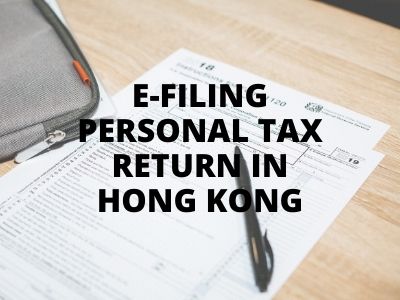This post is also available in:
![]() 繁體中文 (Chinese (Traditional))
繁體中文 (Chinese (Traditional)) ![]() 简体中文 (Chinese (Simplified))
简体中文 (Chinese (Simplified))
Understand the E-filing Personal Tax Return in Hong Kong

In Hong Kong, taxpayers can e-file their annual tax returns with the Inland Revenue Department (IRD). Personal tax is sometimes referred to as salary tax and is directed at individual taxpayers.
Tax Rates in Hong Kong
Hong Kong’s personal tax rates follow a progressive tax rate system and have five tax brackets of 2%, 6%, 10% and 14% and 17%. An individual taxpayer is charged on their income from employment, charitable donations and personal allowances.
Additionally, Hong Kong follows a territorial principle of taxation which means that taxes only apply to income that has been earned in Hong Kong.
The rates for Year of Assessment 2018/19 onwards are as follows:
| Net Chargeable Income (in HKD) | Rate |
| 0– 50,000 | 2% |
| 50,001– 100,000 | 6% |
| 100,001– 150,000 | 10% |
| 150,001– 200,000 HKD | 14% |
| Above 200,001 HKD | 17% |
| Net total income (no allowances) | Standard rate 15% |
Hong Kong does not have the following taxes:
- Capital gains tax
- Dividend tax
- Inheritance tax
E-filing Personal Tax Return
The personal tax return is known as BIR60 and will be assigned to individuals by the Inland Revenue Department (IRD).
Hong Kong’s year of assessment runs from April 1st to March 31st of the following year. The IRD will send out individual tax returns by May 1 and tax returns will then have to be submitted within one month from the date of issue.
With effect from 1 April 2019, there will be 3 supplementary forms to e-filing Tax Return and these forms must be filed together with the return.
Here are important points that every individual taxpayer needs to know:
- Even if there is no income to report, a taxpayer still needs to declare zero income in the tax form.
- If there are any disagreements with the tax bill, a taxpayer will need to inform the tax department within 30 days from the issue date of the tax bill and state their reasons for the objection.
- Even if there is a notice of objection, tax MUST be paid on or before the due date specified.
- People who have previously been assessed as not liable to tax may not receive BIR60 annually. However, they have to notify the Inland Revenue Department (IRD) in writing when they become chargeable to tax not later than 4 months after the end of the basis period for the year of assessment concerned.
If the individual taxpayer is a sole proprietor of a business, they are allowed to file the returns within 3 months from the date of issue. After filing the returns, they will receive a ‘Notice of Assessment’ or tax bill from the IRD which will indicate the amount of tax that needs to be paid for the given year of assessment. It will also state the amount payable for provisional salaries tax for the succeeding years of assessments.
The Commissioner of Inland Revenue reserves the right to impose penalties or issue an estimated assessment if there is late or delayed e-filing of tax returns.



